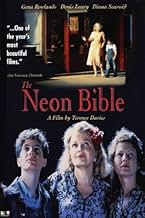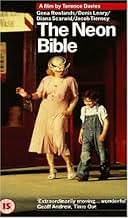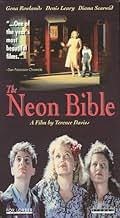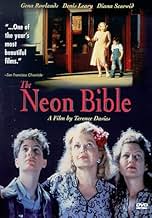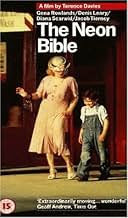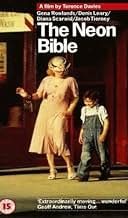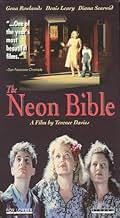John Kennedy Toole is probably my favorite writer of the 20th century, even though he wrote only two books before committing suicide. One of those books - "A Confederacy of Dunces" - has earned a formidable reputation as a whacked-out, satirical masterpiece (it even won Toole a posthumous Pulitzer). His other book, "The Neon Bible," is far more obscure, sincere and frankly melancholy. I like both books, even though they're very different in terms of style.
So, I was naturally quite excited when I stumbled upon the DVD release of this movie; I wasn't even aware that any of Toole's work had been adapted to film. But I was also a little wary. Movies have a tendency to trivialize great books, and I predicted that "The Neon Bible" might, in cinematic form, degenerate into a depressing slog.
Alas, my prediction proved true. This movie is a slog. Director Terence Davies paces it like a funeral procession. He also fills the movie with weird, protracted shots of blackness, of whiteness, of starry skies; I imagine he's trying to be deep somehow, but all his slow zooms just bore me. Besides, at times he overplays the starry sky thing so much that it looks like the protagonists live in a cabin in outer space.
Both the book and the movie are anecdotal, but the book works because David - the shy teenage "hero" - makes an interesting narrator. His voice binds the anecdotes together, and naturally the reader learns about him through the narration. In this movie, though, he's largely silent; he just lurks around in the background of his own story. And, without his narration, the anecdotal scenes often make little sense and have no apparent connection.
I feel guilty about badmouthing this film, to an extent, because it at least strives for faithfulness. But the deadly slow pace really undermines everything. For instance, there's a Christian rally at one point, headed by an evangelist called Bobby Lee Taylor. In the book, this is a rousing set-piece, and Taylor is depicted as an energetic young man who really seems to believe the (ahem) propaganda he spouts. But, in the movie, Taylor is depicted as a lifeless old man, and he basically announces to the audience in an aside that he's a shyster. Ho-hum. That's the Hollywood trivializing machine at work. And the scene as a whole completely lacks energy, verve, oomph - whatever you want to call it.
This is going to sound like a strange statement, but I'm starting to develop a love-hate relationship with movies, with the emphasis on hate. It's always easy and tempting to pop a DVD in my player and relax for the evening, but I find lately that I get a lot more out of indulging in the brain-stimulating alternative pastime of reading. After all, books are, on the whole, lots better than movies. Case in point..."The Neon Bible."
I still can't stop hoping that, one day, they'll make a movie version of "Confederacy of Dunces." But I bet that'll be inferior to the book, too.

